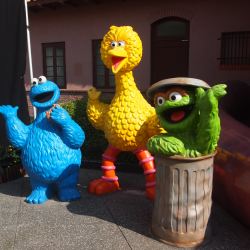In a surprising turn, media outlets just began reporting that Procter & Gamble, the maker of Pampers diapers, has been steathily removing and replacing Sesame Street characters on their product since the start of the summer. The company denied now public whispers of the change being a result of parental feedback of the iconic figures being “too masculine.” As the day has gone on, more firm denials of that narrative have been published by the brand with recognition that they do make changes based on market research of parents (see here and here).
The NY Post had reported, “the world’s biggest diaper brand has quietly wiped characters like Elmo, Big Bird, Cookie Monster and Oscar the Grouch from most of its diapers” despite no formal announcement. The NY Post investigation maintains, “spokespeople were cagey about the reasons” and a mother was told by “customer service reps at P&G partly blamed the stealthy switch on gender issues.” The Sesame Street response included “emailing a link…with details about [Pampers’] current support for our gender equality work.”
Whatever the underlying reasoning, I do not associate any particular gender with any of the characters removed. As a pediatrician, I can’t recall witnessing the young target audience having any preoccupation with gender either. In fact, the ambiguity of their gender has allowed kids the opportunity to be imaginative, welcoming of all shapes, sizes, behaviors and traits.
The beauty is children see the personalities, not the gender. To them, Oscar is green and grumpy, a combination that is magically endearing. Adults see the gender, not the personalities. Marketing divisions of companies sell to parents. Maybe it’s the "grown-ups" that need a deeper dive. Though well-intended, these efforts that fixate on bias can achieve the unintended consequence of imposing it instead.
What is so enduring about the wondrous, diverse personalities in this timeless children’s program is witnessing the sheer joy, universal acceptance, love, and laughter the young children and infants experience in reaction to them. The demographic in diapers or those in toddler terrain enjoy the colors and shapes, the songs, the interactions between human and puppet and the imprinting of heartwarming moments with their families and friends.
Diaper manufacturers are going to respond to the consumer as they are fundamentally driven by economics and tethered to a desire to stay in business. This often clouds whether decisions are actually right, as opposed to simply responding to the market. Children and, especially, the younger set embrace the world around them. The adults in it plant the seeds of what is good and bad, and for better and worse shape their lens.
The expansion of characters in Sesame Street reflecting individuals with autism and differing abilities to now being gender inclusive are great advances in line with societal progress. Selective tolerance and championing should not be the goal. There is plenty of room on that diaper for Big Bird, Oscar the Grouch and their newest friends. Inclusion by exclusion misses the mark.

